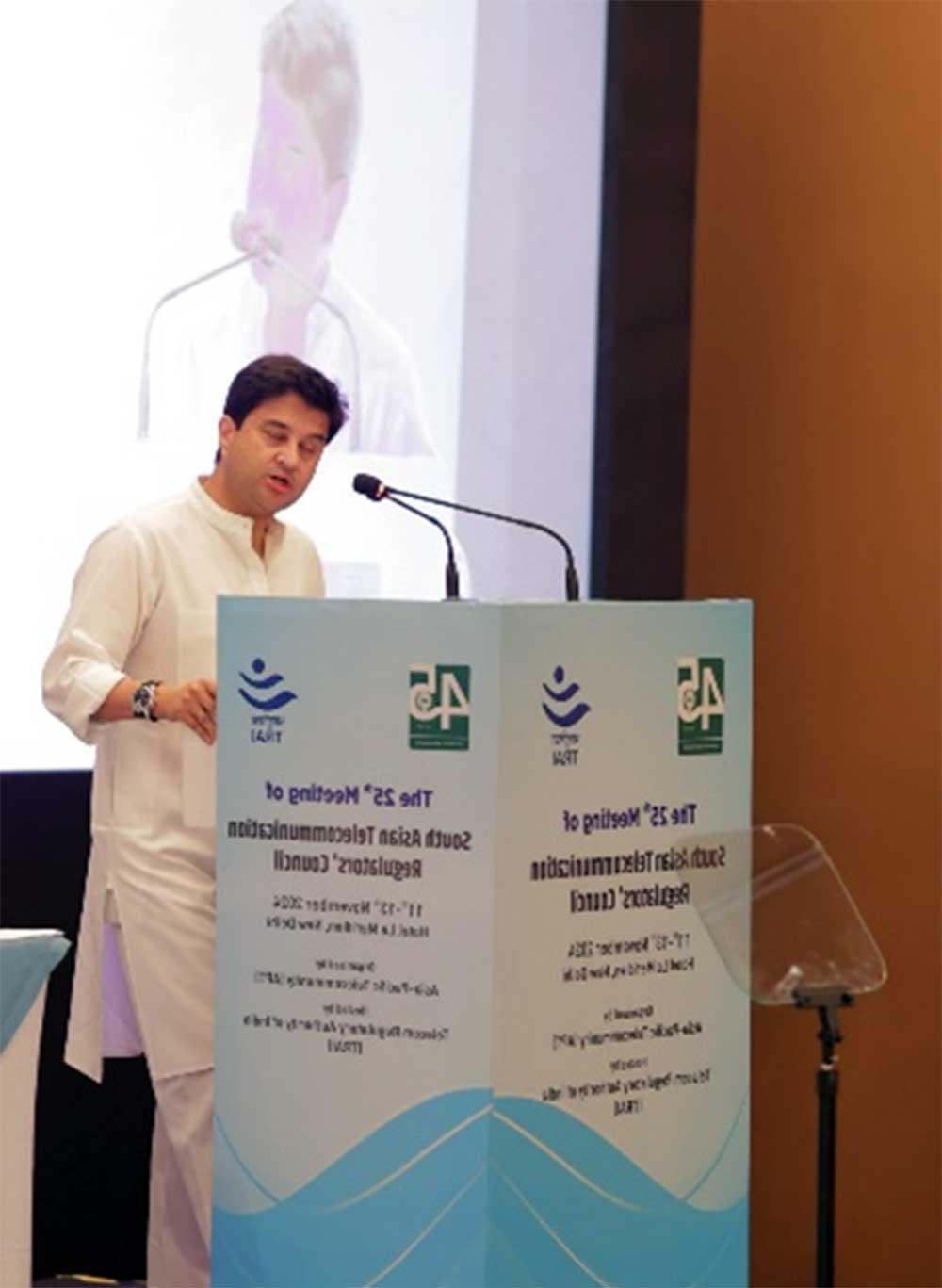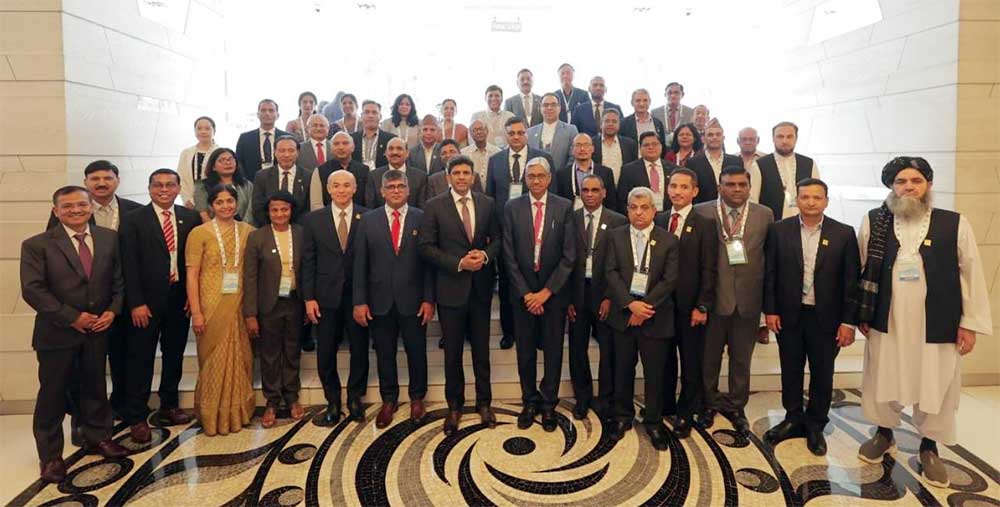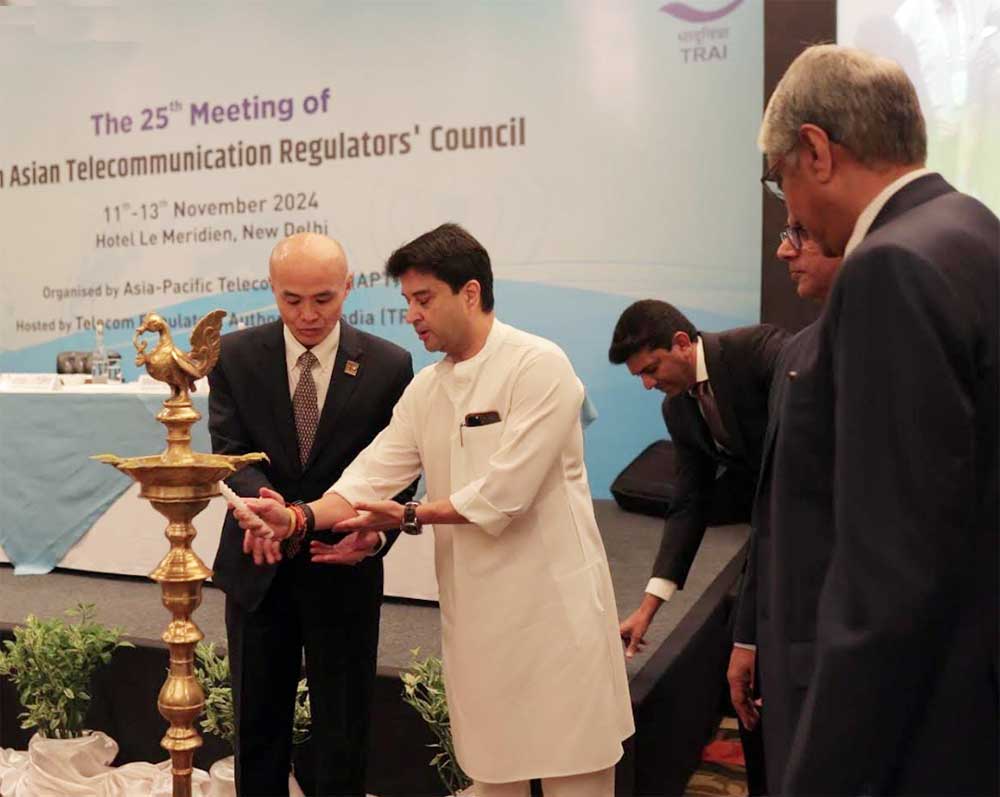- “With 1.2 billion telephones and 970 million internet subscribers, India has emerged as a digital titan. By 2026-27, 20% of India’s economy will be digital,” Minister Scindia.
- “New technology like Non Terrestrial Networks (NTNs) will not only enable our nations to connect the unconnected regions but also advance our collective journey to fulfilling our commitments to UN SDGs,” Minister Scindia.
- Heads of Regulators and affiliate members from SATRC countries viz Afghanistan, Bangladesh, Bhutan, India, Islamic Republic of Iran, Maldives, Nepal, Pakistan and Sri Lanka attending the Meeting
Minister for Communications, Mr. Jyotiraditya M. Scindia, inaugurated the 25th Meeting of the South Asian Telecommunication Regulators’ Council (SATRC-25) today in New Delhi. In his keynote address, Scindia stated, “As India emerges as the Voice of the Global South, the SATRC-25 will serve as an excellent platform for knowledge-sharing and a confluence of innovative perspectives on emerging policy and regulatory challenges.” He further stressed that “secure, safe and standard driven future” should guide the creation of policies by regulatory bodies.

The Minister was addressing a distinguished gathering of Heads of Regulators and affiliate members from SATRC member countries, including Afghanistan, Bangladesh, Bhutan, India, Iran, Maldives, Nepal, Pakistan, and Sri Lanka. Other dignitaries present included Dr. Chandra SekharPemmasani, Minister of State for Communications and Rural Development, Mr. Masanori Kondo, Secretary General of the Asia-Pacific Telecommunity (APT), Major General (Retd.) Mohammad EmdadUl Bari, Chairman of the Bangladesh Telecommunication Regulatory Commission, Mr. Anil Kumar Lahoti, Chairman of TRAI, and Mr. Atul Kumar Choudhary, Secretary of TRAI.

In his address, Minister Scindia underscored India’s leadership in digital infrastructure development, highlighting the country’s commitment to expanding broadband access, enhancing regulatory frameworks, and promoting an inclusive digital ecosystem. “With an extraordinary 1.2 billion telephones and 970 million internet subscribers, India emerges as a digitaltitan, characterized by a rapidly evolving digital economy now comprising 10% of our overall economic landscape—an impressiveleap from just 3.5% a decade ago. As our digital economy flourishes at a pace 2.8 times swifter than the national economy, weanticipate it will reach an astounding 20% by 2026-27.” He urged SATRC member nations to collaborate on key issues such as digital inclusivity, sustainable network infrastructure, and consumer protection. “South Asia must unite in its efforts to build a connected, resilient, and sustainable future,” he said, envisioning a region that thrives on shared values and mutual support.

Mr. Scindia also pointed out that South Asia plays a crucial role in global ICT development and stressed the need for regulations that inspire innovation while ensuring inclusivity. Talking about new technological advancements, he shared, “The advent of NonTerrestrial Networks (NTNs)— presents a transformative opportunity to extend telecom coverage to the most remote corners of our nations. I am optimistic that the evolution of NTNs will unlock new vistas in communication technologies, igniting innovative applications across diverse sectors, and ultimately advancing our collective journey towards the United Nations Sustainable Development Goals (UN SDGs).”

In his speech, Dr. Chandra Sekhar, Minister of State for Communications, reiterated the transformative power of telecommunications in empowering individuals and communities. He highlighted India’s commitment to driving digital transformation across South Asia, while calling for regulatory policies that balance innovation with consumer protection.
Mr. Masanori Kondo, Secretary General of APT, opened the session with a welcome address emphasizing the APT’s mission to support a sustainable and inclusive digital ecosystem throughout Asia. He called for regional cooperation to create harmonized policies that facilitate seamless communication and drive economic growth.
The Chairman of TRAI, Mr. Anil Kumar Lahoti, also welcomed the gathering on behalf of TRAI, emphasizing India’s role in fostering cross-border partnerships to ensure equitable access to digital resources and bridge the digital divide.
The Chair of SATRC, Major General (Retd.) Mohammad EmdadUl Bari, Chairman of the Bangladesh Telecommunication Regulatory Commission, reflected on SATRC’s two decades of progress and expressed optimism for future cooperation in the region, leveraging digital transformation to improve citizens’ lives across South Asia.

The event, organized by the Asia-Pacific Telecommunity (APT) and hosted by the Telecom Regulatory Authority of India (TRAI), brings together experts, international delegates, industry representatives, and service providers from across the region to discuss telecommunication regulations and policy challenges. The three-day meeting, from 11th to 13th November 2024, will focus on issues such as radio frequency coordination, telecommunication development strategies, regulatory trends, and international telecommunication affairs.

